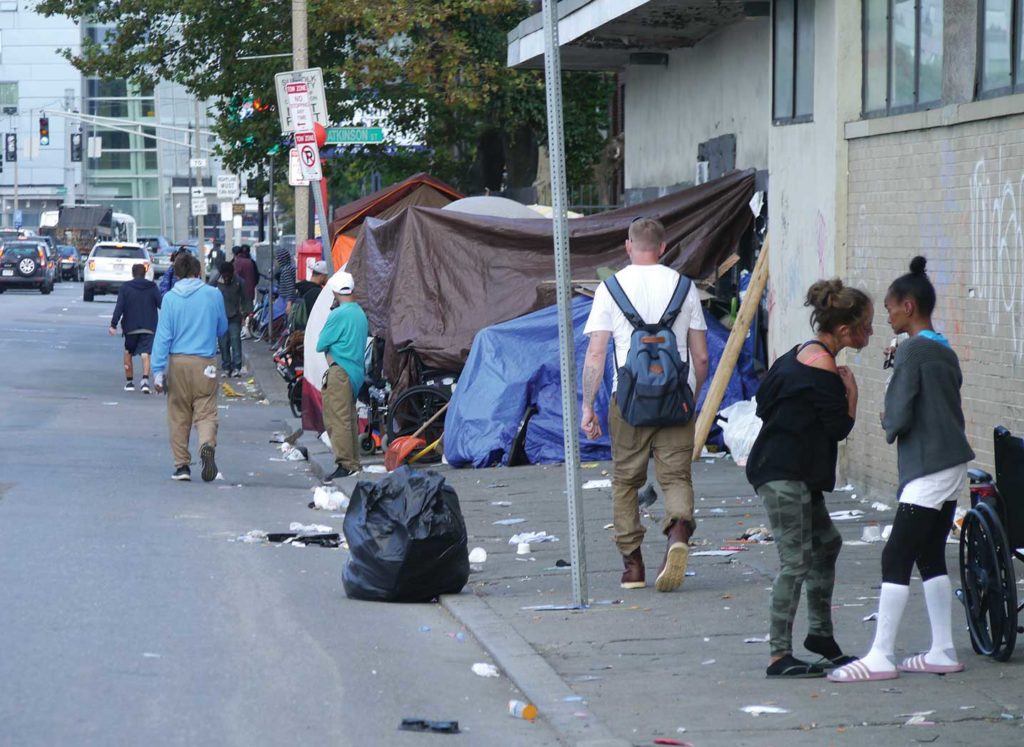Wu, Sudders clash on Mass & Cass
In letter, HHS secretary outlines state efforts

Two weeks ago, Mayor Michelle Wu made a public appeal to the administration of Gov. Charlie Baker asking for the state’s partnership in responding to the crisis of homelessness and addiction and seeking a commitment of 1,000 state-funded units of supportive housing outside Boston.
Wu’s request came as she and other officials in her administration spoke with reporters about the city’s response to the addiction crisis that is currently centered around the Mass and Cass area in Boston. Noting that many of the people who set up encampments in the area and access health services there are from outside of Boston, Wu made the case that the city has stretched its resources thin and cannot shoulder the burden for the state.
Marylou Sudders, the secretary of the Executive Office of Health and Human Services, last week fired back with a sharply-worded letter outlining the state’s response to the addiction and homelessness crisis — including $40 million in funding that the state has so far committed to creating units in Boston, and an additional $33.6 million commitment for such units statewide.
As for Wu’s call for a partnership with the state, Sudders pointed to a series of meetings state officials engaged in with city officials around homelessness and addiction.
“As the Executive Office of Health and Human Services, and our departments of Public Health and Mental Health, have been working so closely with the City on these efforts, it was surprising to hear your comments at a press conference last week and reiterated again on a radio program this week that the City is seeking a ‘partnership’ with the state,” Sudders wrote. “Until the city disbanded its regular coordinating meeting on Mass and Cass in September, key staff from my office and the Department of Public Health were active participants.”
While Sudders’ letter to the mayor, which was distributed to news media, cites a $36.6 million commitment to funding permanent low-threshold housing units across the state, it did not identify a site for such housing outside of Boston.
In Roxbury, state officials received a proposal from a group of nonprofits to site 400 such units at the Shattuck Hospital building in Franklin Park. Local residents and elected officials have in recent weeks raised an alarm that city and state officials are so far planning to concentrate the bulk of housing for people suffering from homelessness and addiction in and around the neighborhood, which they note already has a high concentration of sober homes, group care homes and treatment facilities.
City officials have set a goal of creating within Boston 1,000 units of supportive housing for people experiencing homelessness and addiction, but they have yet to identify a site outside of Roxbury for such housing.
“I’m certainly not a fan of putting 400 units at the Shattuck,” said state Rep. Russell Holmes, whose 6th Suffolk District abuts Franklin Park. “I agree with the mayor that the response has to be regional.”
Both Wu and Holmes have noted that many of those who receive services for addiction in Boston are from communities outside of the city and even outside of Massachusetts. Yet when Boston officials have proposed siting housing or services for that population in other communities, they have faced fierce opposition.
Last year, Revere Mayor Brian Arrigo blasted a proposal by Wu to convert a hotel in his city to a homeless shelter. In a similar vein, Quincy Mayor Thomas Koch has taken legal action to block Boston officials’ plans to reopen the Long Island shelter, which closed in 2014 after the bridge connecting the island to Quincy was determined to be structurally unsound. Although the island is part of Boston, construction vehicles would have to pass through Quincy to work on the bridge.
“Quincy is doing all they can to stop us from building on our own property,” Holmes noted. “You see this resistance from other cities, but they still want to send us all their people.”







